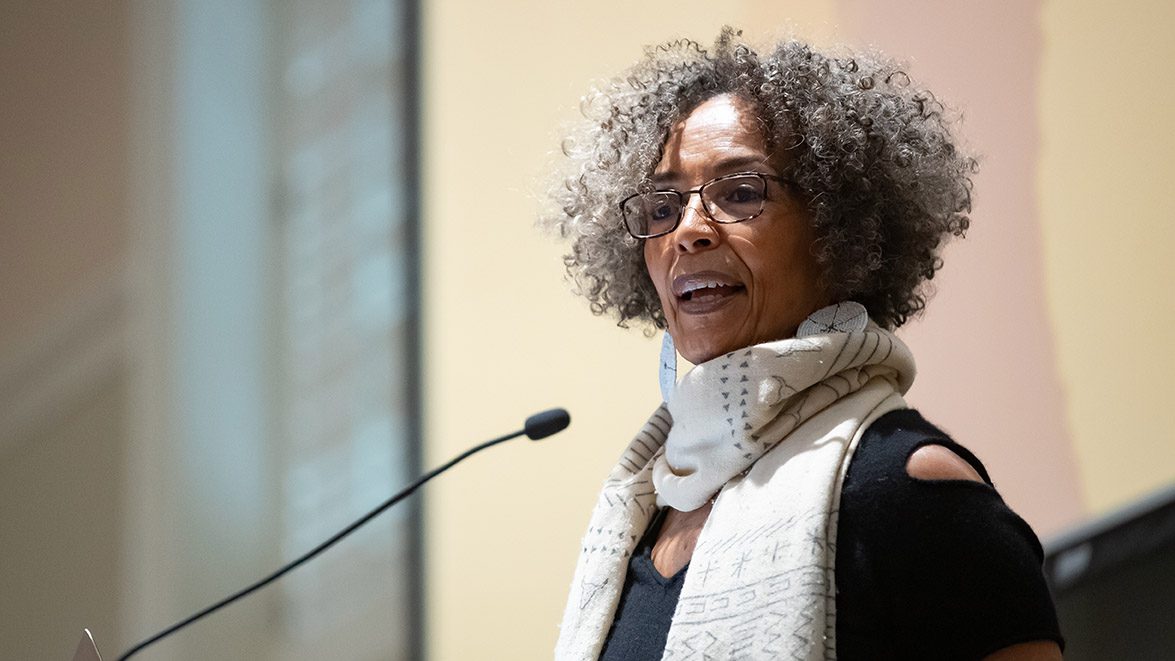Activist Fania Davis offers message of healing and hope at community breakfast

Social justice activist and civil rights attorney Fania E. Davis opened Friday’s community breakfast honoring the life and legacy of Dr. Martin Luther King Jr. with Sawubona, a traditional African greeting.
“Translated from the Zulu, it means I see you. I see your spirit, your goodness, the gift that you are to the world,” Davis said. “I see you beyond the worst thing you have ever done, and I see you beyond the worst thing that has ever been done to you.”
Learning to see beyond those worst things took half a lifetime for Davis after a childhood shaped by violence, racism and fear.
“I was born in the most segregated city of the South, Birmingham (Alabama), aka ‘Bombingham,’” Davis told a riveted audience at Furman University’s Melvin and Dollie Younts Conference Center. “The bombings were meant to terrorize activists in the rising civil rights movement. We lived atop Dynamite Hill. This was my neighborhood, and it was targeted by the Ku Klux Klan and other white race hate groups because black families dared move into this all-white area. I have three siblings, and some of our earliest childhood memories are being awakened in the wee hours to dynamite blasts demolishing nearby homes; the sight of our father grabbing his gun to protect us, his family.”
Some other earliest memories are learning exactly where they stood in society.
“Colored and white were the first words we learned to read, omnipresent words written on bathroom doors, water foundations, lunch counters, buses, everywhere,” Davis said.
On Sept. 15, 1963, Davis lost two close friends, Carol Robertson and Cynthia Wesley, in the infamous 16thStreet Baptist Church bombing. They were among four girls ages 11 to 14 who died in the attack, and the attack propelled Davis into a lifetime of civil rights activism.
“I left the South with a lot of anger and with a ferocious commitment to be a warrior for justice,” she said.
Davis became active in black liberation, and along the way her then-husband was shot by police in their home and her sister, Angela Davis, was arrested for her alleged role in the killing of a guard at Soledad Prison. Angela was later acquitted after a high-profile trial, and the work her attorneys did securing her freedom inspired Fania Davis to become a civil rights attorney herself, which she was for nearly 27 years.
But the fight took its toll, and by the mid-1980s Fania Davis knew something had to change.
“I was enraged against injustice in courtrooms, in the streets … I was burnt out from all the anger. I felt ill,” she said. “I intuitively knew I was being called to bring more healing and spiritual energies in my life to regain a balance.”
In 2003, she earned her Ph.D. in indigenous studies from the California Institute of Integral Studies and embarked on a new life as an advocate for “restorative justice.” Davis is a founder and the Director of Restorative Justice of Oakland Youth (RJOY) in Oakland, California.
“Restorative justice was a game changer for me. This was a new paradigm of justice emerging on the historical state, a justice that seeks not to punish but to heal, a justice that is not about getting even but about getting well,” Davis said.
Furman President Elizabeth Davis kicked off the breakfast, which also served as a launching point for “Building the Beloved Community,” Furman’s week-long celebration of King’s legacy.
“I look forward to this event every year, because it gives all of us an opportunity to pause and reflect on the work of a remarkable human who changed the world through reflection, wisdom and leadership,” she said.
Rabbi Mathew Marko of Congregation Beth Israel delivered the invocation, followed by a brief talk from Qwameck Bethea ’21, student diversity council vice president and NAACP vice president, honoring King and echoing his call for unity.
Tyrese Byrd ’20 sang the gospel hymn “How I Got Over,” composed and published by Clara Ward in 1951 and popularized by Mahalia Jackson. Hearing a first-hand account of what life was like during segregation was “extremely humbling,” he said.
“As a younger generation of African Americans, we hear those stories, but usually it’s not that closely related (to us),” Boyd said. “So to hear she lost two friends in the Birmingham bombings and for her to have lived through that is really powerful.”
Proceeds from the event will go toward the Joseph Vaughn Scholarship honoring Furman’s first African American student. Davis’ talk and other MLK events are presented through a partnership between Furman University and the Alpha Phi Alpha Greenville Foundation.
Fania Davis praised the steps Furman has taken to implement the recommendations of the Task Force in Slavery and Justice as well as the work being done by Universities Studying Slavery, of which Furman is a part.
“I wish to acknowledge Furman university for the first steps it has taken to transform these historical harms. You don’t know how much it means to me to see, to behold the work that you’re doing here,” she said. “I’m very proud of you, and you’re not just saying sorry. You’re doing sorry … I have never seen so much truth-telling about slavery.